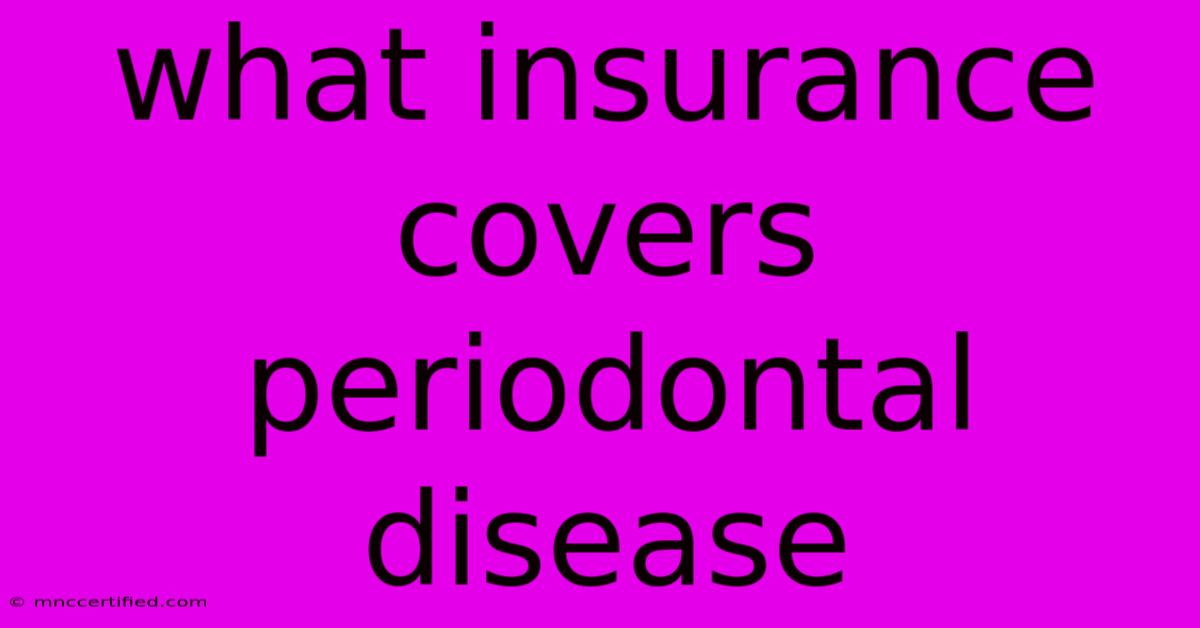What Insurance Covers Periodontal Disease

Table of Contents
Does Insurance Cover Periodontal Disease Treatment? A Comprehensive Guide
Periodontal disease, commonly known as gum disease, is a serious infection that can affect the gums and bones supporting your teeth. If left untreated, it can lead to tooth loss and other health problems. But many people wonder, does insurance cover periodontal disease treatment? The answer isn't always straightforward.
Understanding Dental Insurance Coverage
Dental insurance plans vary greatly. While some offer extensive coverage, others may have limited benefits for periodontal disease. To determine what your plan covers, carefully review your policy documents or contact your insurance provider directly.
Here's a breakdown of common coverage scenarios:
1. Basic Dental Plans:
- Limited Coverage: These plans typically cover preventative care like cleanings and exams but may only partially cover periodontal treatments like scaling and root planing.
- Possible Exclusions: They often exclude procedures like gum grafts, bone grafts, and dental implants, which are more complex and expensive treatments for advanced periodontal disease.
2. Comprehensive Dental Plans:
- Wider Coverage: These plans offer broader coverage for periodontal disease, including scaling and root planing, gum grafts, and even some bone grafts.
- Co-pays and Deductibles: They usually involve co-pays and deductibles for procedures, meaning you'll share a portion of the cost.
3. Dental HMOs:
- Network Restrictions: HMOs often have limited networks of dentists you can choose from. They may also require pre-authorization for certain periodontal treatments.
- Coverage Variations: Coverage for periodontal disease can vary significantly depending on the specific HMO plan.
4. Dental PPOs:
- Greater Flexibility: PPOs offer more freedom in choosing your dentist, but you'll typically pay higher out-of-pocket costs for procedures.
- Coverage Levels: Coverage for periodontal disease can vary within PPO plans, so it's essential to review your policy carefully.
Factors Affecting Coverage
Several factors influence your insurance coverage for periodontal disease treatment:
- Your insurance plan: The type of plan, coverage levels, and exclusions all play a role.
- The severity of your condition: Basic cleaning and scaling may be covered, but more complex procedures like gum or bone grafts might not be.
- Your provider: Some dentists may not be in your insurance network, limiting your coverage options.
- State regulations: Some states have laws requiring dental insurance plans to cover certain periodontal treatments.
Taking Control of Your Dental Health
Proactive Care:
- Regular Dental Checkups: Early detection of periodontal disease can significantly reduce treatment costs and complications.
- Proper Oral Hygiene: Brushing twice daily, flossing regularly, and using an antimicrobial mouthwash can help prevent the disease.
Understanding Your Coverage:
- Review Your Policy: Carefully read your dental insurance policy to understand your benefits and limitations.
- Contact Your Insurance Provider: If you have questions about your coverage, don't hesitate to call your insurance provider.
- Ask Your Dentist: Discuss your treatment options with your dentist and inquire about the cost of each procedure and how much your insurance will cover.
Managing Costs:
- Consider a Dental Savings Account (DSA): DSAs allow you to save pre-tax dollars to cover dental expenses, including periodontal treatments.
- Ask About Payment Plans: Some dentists offer payment plans to help you manage the cost of treatment.
Remember, taking care of your oral health is an investment in your overall well-being. By understanding your insurance coverage and taking proactive steps to prevent and treat periodontal disease, you can maintain a healthy smile for years to come.
Keywords: periodontal disease, gum disease, insurance coverage, dental insurance, treatment, scaling and root planing, gum grafts, bone grafts, dental implants, preventive care, oral hygiene, dental checkups, DSA, dental savings account, payment plans

Thank you for visiting our website wich cover about What Insurance Covers Periodontal Disease. We hope the information provided has been useful to you. Feel free to contact us if you have any questions or need further assistance. See you next time and dont miss to bookmark.
Featured Posts
-
Long Term Care Insurance Attorney Near Me
Nov 07, 2024
-
Shetland Season 9 Episode 1 November 6 2024
Nov 07, 2024
-
Cubarsi Delivers E30 M Transfer News To Deco
Nov 07, 2024
-
West Indies Vs England Odi Score Updates And Analysis
Nov 07, 2024
-
Luton Town Vs Cardiff City Championship Match Result
Nov 07, 2024